
To help clear your conscience we’ve listed all of the major rubbish types and how you should dispose of them to have the lowest possible environmental impact.
Liquid Waste
One of the most common household and industrial waste types is liquid waste. This goes beyond pure detergents too. The liquid waste category covers everything from dirty water, wash water and even rainwater. If any water or liquid is capable of contaminating clean water, it’s listed as liquid waste and you should do your best to have these liquids taken away by professionals.
The two main types of liquid waste are classified as ‘non-point source’ and ‘point source’ waste. Natural liquids like rainwater are classified as non-point source waste whereas manufactured liquids are point source waste.
Solid Rubbish
The largest contributor to landfill is certainly solid rubbish. In all household, commercial and industrial settings solid rubbish is the most frequently disposed type of rubbish. It’s also frequently disposed of incorrectly.
Solid rubbish can be split into four main categories:
Plastic Waste
Typically plastic waste includes bags, jars, bottles, containers and other plastics that can only be used once or twice and will need to be thrown away. Remembering that plastic isn’t biodegradable means that recycling is the only responsible option you’re left with. Put plastics in the recycling bin, or organise a pickup.
Paper Waste
Most common in commercial and educational settings, paper waste is everything from packaging paper to newspaper and junk mail. Although paper is fragile and not very durable it can still be reused a few times, so before you recycle it, do your best to make the most of it.
Metals and Steels
These materials are found almost everywhere in industrial settings, but in the home, they’re quite prevalent too. They include everything from food tins, metal packaging and cabling and the only safe and compliant way to get rid of these materials is to take them to your nearest recycling depot.
Glass and Ceramics
Also popular in all households, glass and ceramic shouldn’t be thrown out in general rubbish. Recycling these is essential too, and you can even get money back for recycling things like glass bottles. Take them to your local recycling depot and you’ll get them out of landfill.
Organic Waste
All waste food, manure, rotten foods and garden waste fit into this category. Thanks to these being organic they’ll actually rot away and be turned into manure by microorganisms, though that isn’t an invitation to just dump them anywhere.
You must make sure your organic waste is separate from your normal waste and placed into a dedicated organic waste bin.
Recyclable Rubbish
Anything in the home or workplace that can be melted down and converted into a new product is counted as recyclable waste. These can be metals, paper, furniture and even some organic waste!
It’s important that you always put these recyclables in their correct bins, or have a removal service collect them for you so that you reduce your impact on the environment. Most local council websites will list what goes into which bin and also where you can find your nearest recycling centre.
Hazardous Waste
Finally, hazardous waste can be categorised as anything that’s toxic, corrosive, reactive or flammable.
This type of waste isn’t just harmful to the environment, but also dangerous to those who handle it. Don’t pour toxic material into the drain or the backyard and certainly don’t just tip it into the bin. A rubbish removal company is highly recommended here too. They’ll know how and where to dispose of it safely.
Fast Quote:

